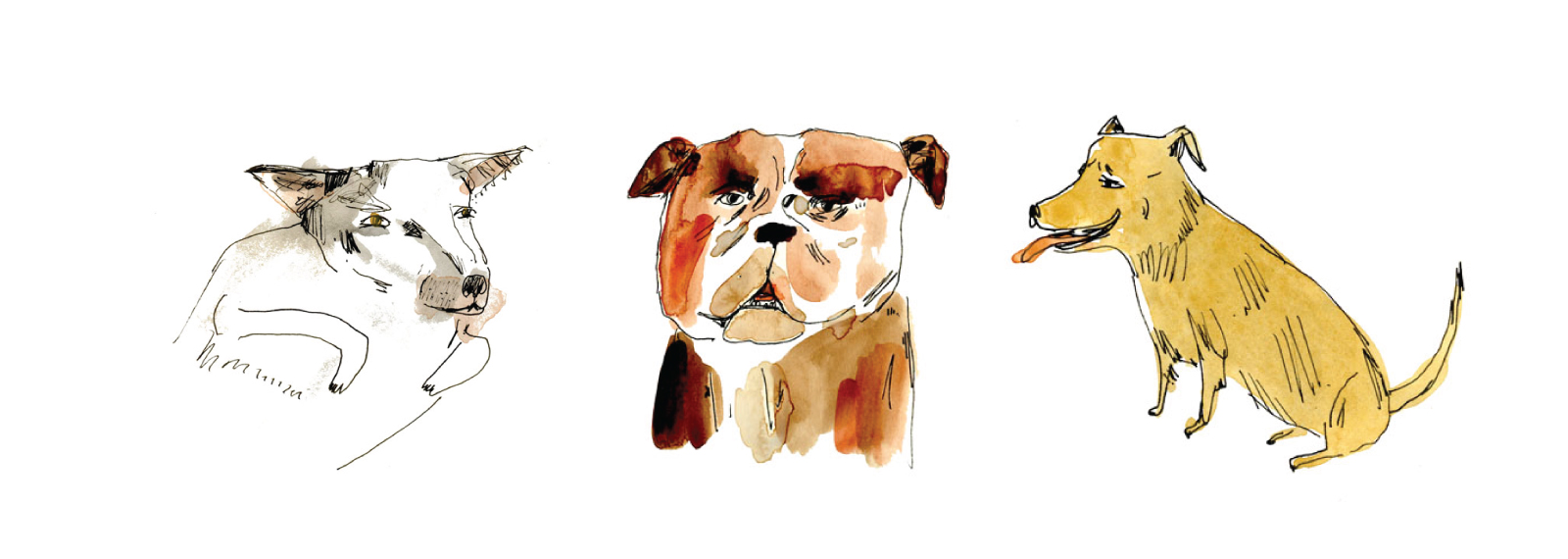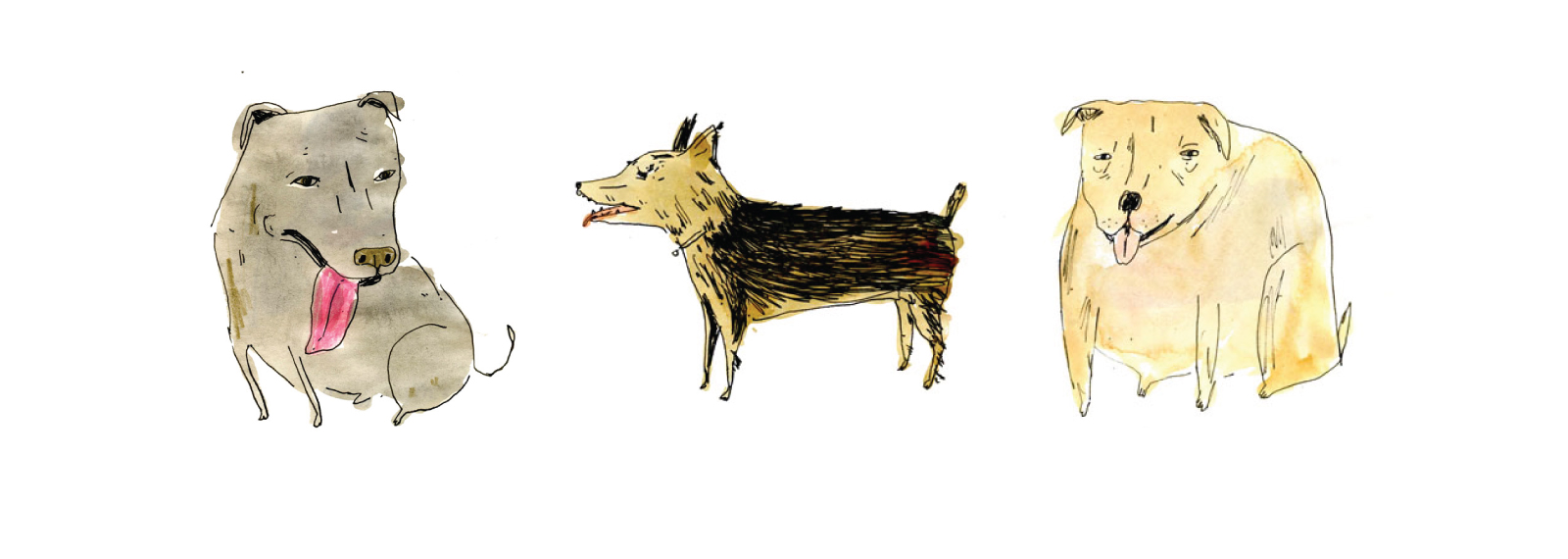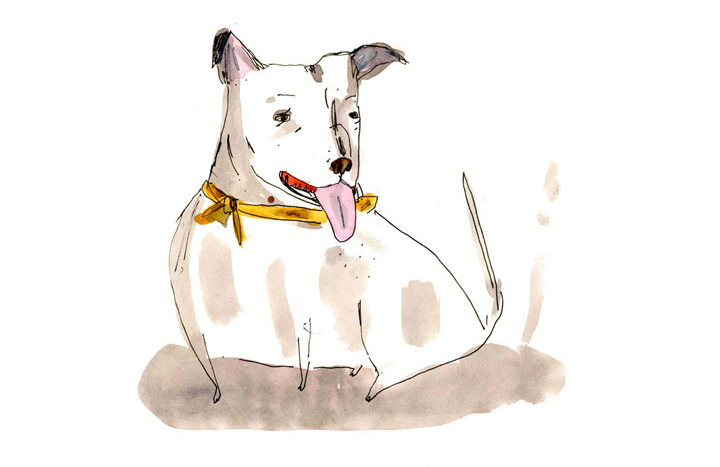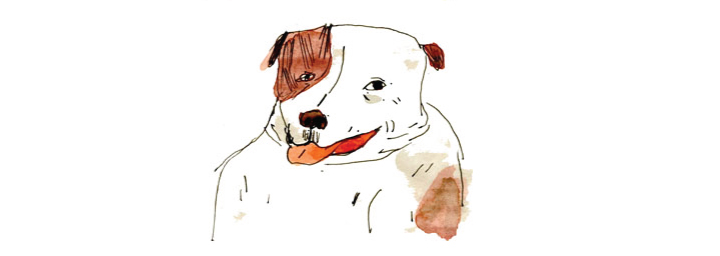Southern Cultures is proud to announce Fred J. Porter as the inaugural recipient of the Druscilla French Prize in Undergraduate Creative Writing. The prize will be given annually to a distinguished graduate of the Creative Writing Program at the University of North Carolina at Chapel Hill.
Charlie’s last day at work had gone like this: somebody, either out of carelessness or just plain old not giving a shit, had left one of the gates to the outer run unlocked during the late afternoon. It was a hot day, one of the last of August, and the dogs had been panting in the shade, their paws burning when they crossed the hot asphalt that stretched between the building and the woodchipped runs. It was the kind of heat where nobody had the energy to do anything, the kind of baking thickness that made just the thought of wearing sleeves break you into a sweat, where all you could do was sit in front of a fan and close your eyes for minutes at a time. The dogs had all been sleeping—hardly any barking or rambunctiousness all day. But someone had left the lock unlatched, probably during one of the bathroom breaks between the dogs’ post-lunch nap and dinnertime, and the dogs had broken through.

Every run, six dogs’ worth, was empty. The gates were wide open, unmoving in the warm evening breeze.
The person who did this was not Charlie. It had to have been Sharon or Ray. Charlie had been inside mopping floors all shift and was just getting ready to bring the dogs in. It had been a grindingly slow day, and he was relieved to step out early that evening, leash slung over his left shoulder, a mint from the front counter in his mouth. In the distance, beyond the river, the sun was setting behind the mountains, casting a purple glow over the tops of the crumbling factories clustered beside the river. A train whistled in the distance and the wind carried the brief scent of the riverbank through the yard. For a minute Charlie simply stood, enjoying the late-summer air on his skin, glad to be away from the Clorox and the cheap mop that you had to squeeze out with your hands. He fastened the door behind him to make sure the dogs wouldn’t gallop back inside unleashed. He thought there might be fireflies that night, and he might give Sofia a call after work to see if she wanted to get some dinner. But when he turned, he swallowed the mint and felt it plummet into his stomach like bad news. Every run, six dogs’ worth, was empty. The gates were wide open, unmoving in the warm evening breeze.

Charlie and Ray informed Sharon that she was in charge of the kennel and then tore off in Ray’s purple Charger. They cruised from street to street, leaning out of the window and yelling the dogs’ names. Ray never turned his music down. He’d pretend to play with the knob if you asked, but it was always at earsplitting level when he talked.
“Sounds like y’all fucked up,” he hollered, a toothpick dangling from his mouth. He was in the middle of quitting smoking cold turkey and chewed toothpicks compulsively.
“I was cleaning the kennel,” Charlie yelled back. “One of you guys left that gate open.” The volume was making his teeth hurt.
Ray shook his head. “I was at the desk, so it wasn’t me. Guess Sharon is going out on her ass, then!” He put a fresh toothpick in his mouth, spitting out fibrous shreds from the old one, and offered one to Charlie, who turned it down.
They drove through the tough neighborhood up on the hill. Ray knew a lot of the guys up there—big, beefy fellas that worked on their cars in the street and sometimes poured their oil down into the sewer. One of them was sitting in a lawn chair on his porch and had seen a pack of dogs heading up the hill towards the woods.
“Movin’ fast,” he said. “Think there was a rabbit or squirrel or something. Looked like a chase.”
So they kept cruising around as it got darker. It was disheartening. Neither of them saw the point in going into the woods—they had left without any supplies, and it would be hopeless to try and corral the dogs in the dark without leashes or carriers. When Ray finally had to put his headlights on, Charlie got frustrated and said they should just head back to the kennel. There was nothing that could be done.
“Half our dogs are gone, Ray. We’re in serious shit.”
Ray had worked through a small pile of toothpicks and was opening another pack from his front shirt pocket. “I was at the desk. Ain’t my fault.”
Sharon swore that it hadn’t been her fault, either. She had moved all the dogs through the runs and triple-checked the gates when she came through. “One of the dogs could have nudged it open, I guess,” she said, when Ray and Charlie had come back after the streetlights had started clicking on. The three of them all stared at the phone in the center of the front desk.
“Charlie was the one that found the dogs gone,” Ray said. “He ought to call Barbara.”
Charlie knew that he would be fired over the phone. “I don’t want to. Sharon, you do it. She likes you best.”
Sharon considered it. “No. Ray, you can get away with anything. You do it.”
Ray worked on another toothpick. “Nah, I got my last few car payments left. I can’t lose the money. We ought to just pin it on a dog. They probably did it anyway.”
We ought to just pin it on a dog. They probably did it anyway.

Charlie could appreciate a good dogfight. There was a feisty, footballish pleasure in seeing which dog would come out on top, which dog would pin the wriggling other and look happily back at Charlie, proud of its victory. The dogs were almost always just playing. They would roll around for an hour and finally collapse on top of one another, exhausted and ready for a nap. Then he would pick up the sleepy dogs and they’d sag in his arms, all the fight gone out of them.
If they called their boss, however, there would be no long slow wrestle, no veneer of dominance over a core of play. Barbara was quick and brutal. They all knew, staring at each other around the desk, that they’d be canned. Losing dogs was big-time shit.
There was a silence while each tried to figure a way out. Then Charlie spoke up.
“I’ll go back out with some lights and look for them,” he said. “Does anyone want to go with me?”
The initial silence suggested a no.
“I don’t think we all need to go,” Ray said eventually. “There’s still some stuff that needs to be done here, anyway.”
“Gotta mop the floors,” said Sharon. “And balance the books. We made fuck-all today, but still.”
“Well, you two should at least stay here and wait for the dogs to come back then,” Charlie said. “Maybe overnight. We can’t go home without knowing where the dogs are.”
Ray and Sharon hesitantly agreed. It was better than facing Barbara.
Charlie went back outside and scanned the sky. The sun was just peeking out from behind one of the mountains in the distance. Dusk was nearly through, and the fireflies were lighting up the parking lot. On a normal night he’d be going home about now, or maybe over to Sofia’s. They’d watch a movie and eat a frozen pizza or something. He might get to see Sofia a lot more after this week if he didn’t find the dogs. He’d be around so much that she’d get sick of him and start sleeping back at her house on weekends again, even though she had just put a toothbrush right next to his on his bathroom counter.
There wasn’t much opportunity to meet women when you worked at a dog kennel. Charlie had known Sofia in high school, but when he’d ended up back in town with a useless degree and no cash and started working at the kennel, they’d reconnect by chance at the discount supermarket or while renting movies at the library or wherever else the budget-conscious congregated. He liked her more now than he remembered from high school. She had an unusual talent at carpentry. Her house was full of projects that she’d built—birdhouses, chairs, or whatever. A relationship began, at first to save money on gas by sharing rides, but it was growing into something better, he hoped.
He gave her a call. She picked up on the eighth ring.
“I’m going to be working late tonight. Some dogs got out, and we might have to sleep here in case they come back. Now that it’s dark, they might come back soon, but I’ll probably be out looking for them for a while.”
She exhaled, painfully slowly, and then said, “Okay. I guess I’ll just see you this weekend, then. I’m going to be busy tomorrow and Friday.”
“Why’s that?” he said, wondering if she was lying, but only halfheartedly willing to find out.
“Work,” she said. “I’ll be tired all night.”
“Oh, OK,” he said. “But can’t I come over after I’m done here?”
“I mean, you can, but I really don’t feel like doing much tonight,” she said. “It’s already late, and you’ll smell like dogs if you don’t go home and shower first anyway. That’s like an extra hour, and . . . I mean, you know.” She hung up with a brief goodbye.

There was some dirty magic to the factory district once the sun went down.
He went back inside, where Sharon and Ray were arguing about who’d take the first shift and the second shift. Ray was making a bed on the floor out of some old fluffy blankets that they kept in the closet. He gave Charlie his keys. “Good luck, man. Let us know if you find them. Just pile ’em into the backseat. Try not to ruin the car.” He stretched out luxuriously on his new mattress and waved Charlie out.
So, after putting a bunch of dog carriers in the backseat, Charlie drove through the neighborhoods, much more slowly than he had with Ray earlier. The last bits of evening were nearly over. Porch lights were glimmering from each house, shining light on the cracked asphalt and straggling weeds growing through. It was a rough part of town, but there was some dirty magic to the factory district once the sun went down. The burnt-out warehouse roofs had all collapsed, and when you drove by them you could see stars through their windows. Past the river, the sun sank behind the final mountain, and the world dimmed to a velvety black, ugly graffitied buildings fading into giant soft silhouettes. You could hear the river drawling in the distance. Through the rolled-down window he heard the whistle of a train crossing in the distance and a dinging bell where the tracks crossed the road. In high school, he had parked a car by the train crossing with a girl that he knew in an attempt to impress her. It had been 2AM, and they’d had a long talk that almost ended with him kissing her. Just at the wrong moment, however, the train had come past, and a huge engineer had leaned out of the engine and waved. He was a morbidly obese man with a giant smile. They’d waved back, laughing, and the moment had been ruined.

He hadn’t been expecting much when he started out, but to his surprise he saw one of the dogs as he turned a corner. It was Muffin, a muscly pitbull who belonged to an older hippie. She was sniffing through a pile of garbage outside of a little pizzeria that was popular with the few remaining workers around. He put his hazards on, pulled over, and took a Milk Bone in each hand. Getting out, he dropped down onto one knee and turned away from Muffin.
She’s a free spirit and she doesn’t like to be defined or enclosed, her owner had said, his crystals tinkling against his neck as he explained his dog’s delicate psyche to a totally uninterested Sharon earlier that week. Give her some space. Let her breathe. Don’t corner her or overwhelm her. Make sure you’re centered.
He clicked his fingers and snapped the Milk Bone in half. “Hey, Muffin. Hey, girl. C’mere, Muffin,” he said.
Muffin thumped her thick pitty tail on the sidewalk and and galloped over, slurping her mouth over the Milk Bone and offering her head up for scratching. She didn’t seem too spiritually overwhelmed, so he turned towards her and started massaging her ears. Charlie had a thing for pits. Some friends in college had a pitbull that he had liked to wrestle in the backyard. His favorite part was their big, stubborn heads that were built like cinderblocks. He got a leash on her and put her in the passenger seat. She was the largest dog that had escaped and wouldn’t really fit in one of the carriers; plus, he wanted to keep scratching that head.
They kept driving around, Muffin with her head on his right leg. He didn’t stop for red lights since the neighborhoods were totally deserted. They passed warehouse after dilapidated warehouse. Makes the rent cheap, Barbara liked to say.

It really was the dogs that had gotten him working at the kennel. He had always liked dogs, and enjoyed spending hours in the kennel yard throwing balls, or sitting in the office with a dog on his lap, massaging its stuffed little belly after breakfast. Sofia didn’t like dogs all that much. She hated it when he came home with dog hair all on his sweater or in his socks. “Jesus, Charlie, this doesn’t make me want to stay over more,” she’d said more than once. “I’ve seen your carpets.” To be fair, she was allergic, but her insistence always grated on him.
He had possessed an expectation of bigger and better things than working in a dog kennel back home and being in an ambiguous lukewarm relationship after college.
His frustration wasn’t really her fault. He had possessed an expectation of bigger and better things than working in a dog kennel back home and being in an ambiguous lukewarm relationship after college. When he had first starting working at the kennel, the week after coming back to town with next to nothing to his name, the boss had followed him around the first day and made sure that he was doing every little thing right. Barbara liked things done a certain way, and she’d spent twenty minutes watching him fold towels. He knew the steps by heart: stretched at arms’ length, then brought together in the center, folded over in half lengthwise, and then folded over again. He used to throw all his towels on the floor at home, or hang them over a bannister, but now he folded them just like he’d been taught, his work habits bleeding into his home life until he was scrubbing his floors with bleach because nothing else seemed quite clean enough. He was an empty cup that’d been filled up by a dead-end job. He figured that this probably grated on Sofia, too. She often talked about how maybe he could try Pine-Sol like everyone else.
He pulled off to the side of the road in a bank parking lot and called Sofia again. The phone rang several times, until she finally picked up. “Hello?” She sounded irritated.
“Do you want to get a dog?” he said.
He could imagine her blinking on the other end. “What?”
“I’m here with a pretty great pitbull, and I think it’d be cool to get one. We could keep it in between our houses and swap off every week or something. Or it doesn’t have to be a pitbull—it could be a poodle or something hypoallergenic.”
“Charlie,” she said, “I really don’t like dogs.” An ambulance passed by his car and the siren blocked out what else she might have said.

“I mean, I know,” he said. “I guess it was just a thought. Hey, how are you? I’m out here driving around, looking for some lost dogs. No idea where they are. If the boss finds out, we’ll probably all get fired.”
He could hear Sofia yawn on the other end. “Well, jeez, don’t let her find out, then. I’m okay, I guess. But it’s kind of late, Charlie, and I have work in the morning. If you get done before midnight, just give me a call and maybe if I’m not too sleepy you can come over. Otherwise, I’m probably going to take a shower and go climb into bed.”
He said okay and goodbye and hung up. If he went over there after work, maybe he’d be able to eat some leftovers of whatever she’d had for dinner. The best he could hope for was a little Indian food or a slice of pizza in the fridge. He restarted the car.
Charlie and Muffin drove past the middle school perched on the hill. No dogs there. A few blocks over, they passed a few churches. No dogs there, either. A slow cruise past the woods, with Charlie sticking his head out of the car and yelling, did nothing but wake up Muffin, who thumped her tail against the seat and put her head back in his lap. He scratched her head as she snuffled and licked his hands, hoping for another Milk Bone.
“Where’d your pack get off to?” he said. He didn’t want to get out into the woods with a flashlight and start yelling, but it might come to that.
His phone lit up in the cup holder. A text from Ray: Barbara’s here. She fired you. Sorry man. Please bring my car back.
He didn’t really know how to respond to that, so he just replied ok. He was surprised that there wasn’t any of the sadness he might have thought about losing his job. The little apartment he kept with the leaky appliances and lampfuls of dead insects certainly wouldn’t pay for itself, though. Maybe he could grovel. He was young and needed money and his pride had been hit hard ever since he started scooping up after dogs to pay off his college loans and to buy his maybe-girlfriend dinner at Applebee’s every other Friday night. Groveling was certainly a viable option. He pulled the car around and headed back to the kennel. When he picked up speed and went back through the darkened neighborhoods, he rolled down the window so that Muffin could stick her head out. Her cheeks flapped in the night wind. Damn, she was a really good dog.

He decided not to grovel.
“You let the dogs loose, didn’t call me, and decided to start calling the shots around here? The fuck do you think you are?” Barbara was a tornado of a woman. He knew from the way that she was holding his last paycheck—gripped so tight in her hands that the envelope had torn through—that he had no hope for his job, but the accusation still made him angry.
“I didn’t let the dogs loose,” Charlie said, his face flush, trying to will his voice not to crack. “I don’t know who did, but it wasn’t me. Jesus, I was just trying to help.”
She waved a hand in front of his face. “I don’t believe you. This is inexcusable. I bet you didn’t even see a single dog while you were out driving around, huh?”
He thought of Muffin in the Charger outside. “No, ma’am, I didn’t.”
Barbara swept everything off the counter in a rage, cursing her bad luck in having such horrible employees, and told him to get out. Ray was waiting outside to give him a ride home. He waited a few minutes before clearing his throat and speaking to Charlie.
“Barbara came in and threatened to fire all of us if we didn’t tell her what happened. So Sharon said that you found the gate open and kind of let Barbara assume you did it. I’m sorry, man. I’d have spoken up, but these damn payments would put me in debt otherwise, and we didn’t know what else to tell her.”
Ray didn’t mention the pitbull in his back seat. They floored it up the hill in silence. Muffin liked this part especially—her head was out the window, ears whipping in the wind. When he dropped them off, Ray scratched Muffin under the chin. “Muffin, huh? She’s a good one. Take it easy, man.”
It was about midnight by the time he got back to his apartment. He sat on his couch, looking at the peeling paint and listening to the refrigerator pulsing in the kitchen. He checked his phone—no messages from Sofia. He thought about calling her, but instead he scratched Muffin’s ears as she sat next to him on the stained couch. He figured he’d probably have a few days until Muffin’s owner got back, but, honestly, as far as he knew, Muffin was lost forever. Maybe it was for the best. He didn’t think her owner deserved her. Barbara sure didn’t.
Muffin stretched out on the couch and he rubbed her belly again until she fell asleep in his lap. She started to snore. Midnight came and went and he still didn’t call Sofia. If he went over to her house, or if they eventually moved in together, where would Muffin go? Ray was right: she was an awfully good dog. The prospect of keeping her made him undeniably happy. He scratched her behind the ears, her pitty paws twitching in her sleep, and thought about it for a long time.
Fred Porter received his BA from UNC-Chapel Hill in 2016.
Elizabeth Graeber is a freelance artist and illustrator living in Washington DC. Materials used include pen, ink, watercolor and gouache paint on paper. See more of her work here.

